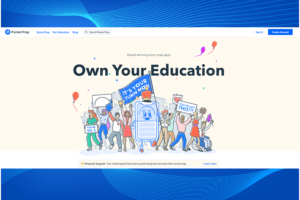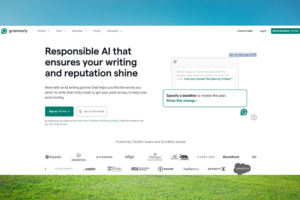Table of Contents
ToggleDatacamp reviews – About Datacamp
DataCamp is a prominent online learning platform specializing in data science, statistics, and programming. Established in 2013, it has grown to serve over 14 million learners across 180+ countries. The platform is designed to cater to a wide range of users, from complete beginners to seasoned professionals seeking to enhance their skills in data-related fields.

Datacamp reviews – About Datacamp
Course Offerings
DataCamp provides a variety of courses, tracks, and certifications focused on:
- Data Science
- Machine Learning
- Artificial Intelligence
- Statistics
- Programming Languages (such as Python and R)
The platform emphasizes hands-on learning through interactive coding exercises, quizzes, and projects, allowing learners to apply concepts in real-time. Each course is structured to promote engagement and retention of knowledge, making it suitable for self-paced learning.
Subscription Plans
DataCamp offers several subscription options:
- Free Plan: Provides limited access, allowing learners to explore the first chapter of over 430 courses.
- Premium Plan: Grants unlimited access to the entire course library, including certifications and professional profiles. This plan is available on a monthly or annual basis.
- Business Plans: Tailored for organizations, these plans include features like team assignments, progress tracking, and advanced analytics. They are designed to upskill employees efficiently and effectively.
Community and Support
DataCamp fosters a vibrant community, offering resources such as tutorials, cheat sheets, and a dedicated Slack channel for learners to connect and share insights. The platform also provides assessments to help users gauge their skills and receive personalized course recommendations.
Certification and Value
While DataCamp offers certificates upon course completion, it is important to note that these certificates are not accredited. This may be a consideration for learners seeking formal recognition from educational institutions. However, the platform is recognized for its quality content and has partnered with numerous companies, including Google and eBay, to enhance employee training.
DataCamp is an excellent resource for anyone looking to build or enhance their data skills. Its interactive format and diverse course offerings make it appealing for learners at all levels. However, those seeking accredited certifications may want to explore other platforms like Coursera or edX. Overall, DataCamp stands out for its engaging approach to learning and its commitment to democratizing data education.
What types of courses does DataCamp offer?
DataCamp offers a wide variety of courses and learning paths tailored to different aspects of data science, programming, and analytics. Here’s a detailed overview of the types of courses available:

What types of courses does DataCamp offer
Course Categories
- Programming Languages
- Python: Courses cover data analysis, data manipulation with pandas, and machine learning using libraries like scikit-learn.
- R: Focuses on data visualization with ggplot2, data manipulation with dplyr, and statistical analysis.
- SQL: Teaches database management, querying, and data manipulation across various SQL databases.
- Data Science Fundamentals
- Introduction to Data Science: Non-coding courses that cover the basics of data science concepts, methodologies, and applications.
- Data Literacy: Courses aimed at understanding data types, structures, and ethical considerations in data handling.
- Machine Learning
- Courses that introduce machine learning principles, including supervised and unsupervised learning, model evaluation, and advanced techniques like ensemble methods.
- Data Visualization
- Courses that teach how to create impactful visualizations using tools like Power BI, Tableau, and libraries in Python and R.
- Statistics and Probability
- Courses focusing on statistical concepts, hypothesis testing, and data analysis techniques essential for data interpretation.
- Specialized Topics
- Time Series Analysis: Courses that cover modeling and forecasting techniques for time-dependent data.
- Text Mining: Focuses on extracting insights from textual data using natural language processing techniques.
- Tools and Technologies
- Excel: Courses designed to enhance skills in data manipulation and analysis using Excel.
- Cloud Computing: Introduces cloud concepts and tools relevant to data science.
Learning Paths
DataCamp also offers structured learning paths or “tracks” that guide learners through a series of related courses to build comprehensive skills in specific areas, such as:
- Data Analyst: Focused on SQL, Python, and data visualization.
- Data Scientist: Combines programming, statistics, and machine learning.
- Data Engineer: Covers data pipeline construction and management.
Interactive Learning
All courses on DataCamp emphasize hands-on learning through interactive coding exercises directly in the browser, allowing learners to apply concepts in real-time without needing complex setups or installations.Overall, DataCamp provides a robust platform for anyone looking to enhance their data skills, whether they are beginners or more advanced learners seeking to specialize in specific areas of data science and analytics.
What are the main differences between the Basic and Premium plans on DataCamp
DataCamp offers two primary subscription plans for individual learners: the Basic Plan and the Premium Plan. Here are the main differences between these two options:
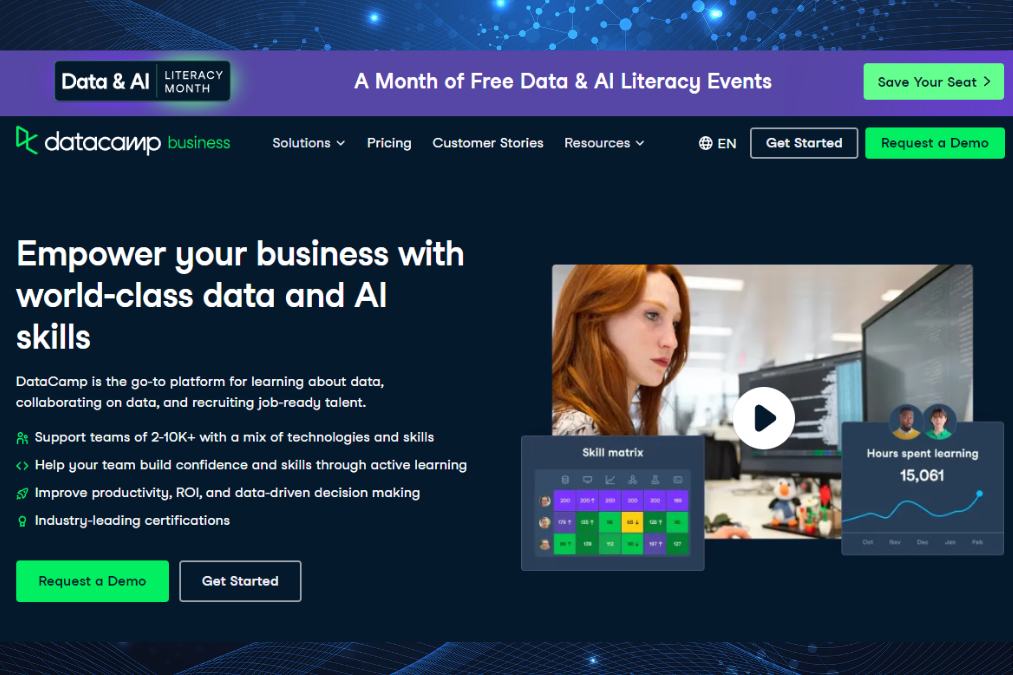
What are the main differences between the Basic and Premium plans on DataCamp
Basic Plan
- Cost: Free of charge.
- Access: Users can access only the first chapter of each course. This limited access allows potential learners to preview content but does not enable them to engage with the full course material.
- Features:
- Includes access to cheat sheets and tutorials.
- Allows users to take skills assessments.
- Provides access to DataCamp’s job board for job applications.
- Limitations:
- No certificates of completion are available.
- Limited coding projects and exercises.
Premium Plan
- Cost: $39 per month or $300 annually (prices may vary based on promotions or changes).
- Access: Unlimited access to over 490 courses, including all chapters and materials.
- Features:
- Comprehensive learning paths, including skill tracks and career tracks.
- Access to coding projects and the ability to earn certificates of completion.
- Personalized learning paths and skill assessments.
- Interactive, hands-on coding exercises and engaging video content.
- Priority support and additional resources for serious learners.
- Benefits:
- Ideal for individuals looking to deepen their knowledge and skills in data science and analytics.
- Offers a structured approach to learning with the ability to track progress and achievements.
In summary, the Basic Plan serves as an introductory option for users to explore DataCamp’s offerings without any financial commitment, while the Premium Plan provides extensive resources and support for those committed to advancing their data skills.
How DataCamp Compares to Other Online Learning Platforms
DataCamp is a specialized online learning platform focused on data science and analytics, offering a range of interactive courses primarily in R, Python, SQL, and other data-related technologies. To understand how DataCamp compares to other online learning platforms, we can look at its strengths and weaknesses relative to platforms like Coursera, Udemy, and freeCodeCamp.
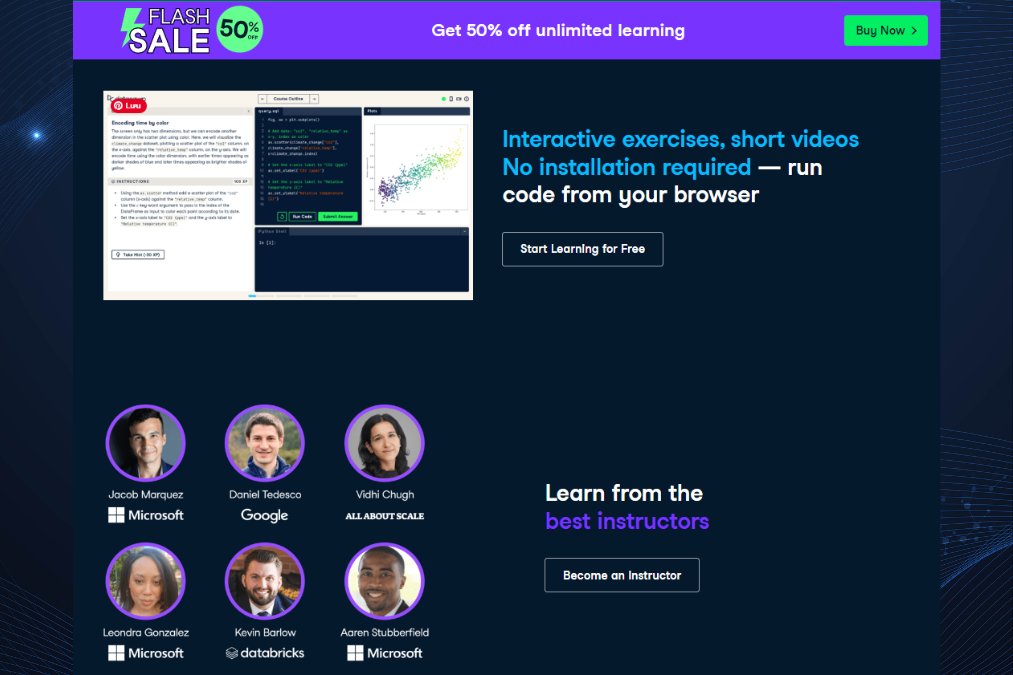
How DataCamp Compares to Other Online Learning Platforms
Course Offerings and Focus
- DataCamp: Offers over 350 courses specifically in data science and analytics, with a strong emphasis on hands-on learning through interactive coding environments. The platform is designed for both beginners and advanced learners, providing structured learning paths and practical applications in data science.
- Coursera: Features a vast catalog of over 7,000 courses from top universities and organizations, covering a wide range of subjects beyond data science. This includes professional certificates and full degree programs, making it a versatile option for learners seeking formal education.
- Udemy: Offers a diverse range of courses across various topics, not limited to data science. With a marketplace model, Udemy allows instructors to create and sell courses, resulting in a wide variety of content quality and teaching styles.
- freeCodeCamp: Primarily focused on coding and web development, freeCodeCamp offers a larger number of courses (around 1,000) but lacks the specialized focus on data science that DataCamp provides.
User Experience and Support
- DataCamp: Known for its user-friendly interface and excellent customer support, with high ratings on platforms like Trustpilot (4.5 stars) and G2 (4.6 stars). The platform emphasizes interactive learning, gamification, and community support through Slack channels.
- Coursera: While it offers a comprehensive learning experience, the user interface can be complex due to the vast amount of content. Customer support varies, as many courses are managed by individual universities.
- Udemy: Offers a straightforward user experience, but the quality of courses can be inconsistent due to the open marketplace model. Support is generally adequate, but it may not match the personalized assistance found on DataCamp.
- freeCodeCamp: Being a free platform, it lacks dedicated customer support but has a strong community-driven approach with forums and chat groups for learners.
Pricing Structure
- DataCamp: Offers a subscription model with a Premium plan that provides access to the entire course library for $15 to $40 per month. This includes certifications and project-based learning.
- Coursera: Provides various pricing options, including a subscription model (Coursera Plus) for around $35 to $55 per month, but many courses require payment for certification.
- Udemy: Courses are typically sold individually, with prices ranging widely, often discounted. This model can be cost-effective for learners who wish to take specific courses rather than a full program.
- freeCodeCamp: Completely free, making it an attractive option for learners on a budget, although it does not offer formal certifications.
Overall Ratings
In comparative analyses, DataCamp consistently scores higher than platforms like freeCodeCamp and Udemy in terms of user satisfaction and course quality. For instance, DataCamp has been rated 9.8 in comparison to freeCodeCamp’s 7.2 and Udemy’s 9.0.
| Platform | Overall Rating | Focus Area | Course Count | Pricing Model |
|---|---|---|---|---|
| DataCamp | 9.8 | Data Science & Analytics | 350+ | Subscription |
| Coursera | 8.8 | Various (University Courses) | 7,000+ | Subscription/Pay-per-course |
| Udemy | 9.0 | Diverse Topics | 150,000+ | Pay-per-course |
| freeCodeCamp | 7.2 | Coding & Web Development | 1,000+ | Free |
In conclusion, DataCamp stands out for those specifically interested in data science and analytics, offering a focused curriculum, interactive learning experiences, and strong customer support. However, for learners seeking a broader array of subjects or formal degrees, platforms like Coursera may be more suitable. Conversely, freeCodeCamp offers a cost-effective solution for coding enthusiasts, albeit with less specialized content in data science.
Are there any free courses on DataCamp?
DataCamp does not currently offer completely free courses; however, it provides limited free access through its Basic plan. Here are the key points regarding their free offerings:

Are there any free courses on DataCamp
Free Access Features
- First Chapters of All Courses: Users can access the first chapter of every course available on DataCamp. This allows learners to explore the content and teaching style before deciding to subscribe.
- Basic Plan Limitations: While the Basic plan provides access to the introductory chapters, it does not include full course access, projects, or completion certificates. Users can also engage in limited practice exercises and track their learning progress.
- No Credit Card Required: Signing up for the Basic plan does not require entering credit card information, making it a straightforward way to sample courses.
Additional Offers
- Occasional Free Trials: DataCamp occasionally runs promotions that allow users to access all premium features for a limited time, typically around a week. These promotions may not be available at all times but can be a great opportunity to explore the full range of courses.
- Educational Discounts: Students may also access DataCamp through educational programs like GitHub Education, which sometimes offers extended free access for students with valid school emails.
Recommended Free Courses
While the first chapter of each course is accessible, here are some popular introductory courses that users often find valuable:
- Introduction to Python for Data Science
- Introduction to SQL
- Introduction to Data Visualization with Matplotlib
These courses provide a solid foundation in data science concepts and programming.In summary, while DataCamp does not offer entirely free courses, the ability to access the first chapter of each course through the Basic plan allows learners to evaluate the platform before committing to a paid subscription.
Does DataCamp offer a certificate upon completion of the course?

Does DataCamp offer a certificate upon completion of the course
Statements of Accomplishment
- What They Are: These are awarded upon the completion of individual courses or tracks on DataCamp.
- Purpose: They serve as a recognition of participation and completion but do not require any formal assessment. Essentially, they indicate that a learner has engaged with the course material.
- Availability: Users can download these statements or share them on platforms like LinkedIn after completing a course or track.
Certifications
- What They Are: DataCamp also offers formal Certifications for roles such as Data Scientist, Data Analyst, and Data Engineer. These certifications are designed to validate a learner’s proficiency in key competencies relevant to these roles.
- Assessment: Unlike the Statements of Accomplishment, obtaining a certification involves passing rigorous assessments, including timed exams and practical case studies. This process is intended to ensure that candidates meet industry standards of knowledge and skill.
- Eligibility: Any DataCamp subscriber can register for these certifications, and preparation materials are provided to help candidates get ready for the exams.
What are the most popular courses on DataCamp?
DataCamp offers a variety of courses tailored to different skill levels and interests in data science and analytics. Here are some of the most popular courses available on the platform:

What are the most popular courses on DataCamp
Most Popular DataCamp Courses
Python Courses
- Introduction to Python: A foundational course for beginners, covering basic programming concepts and data manipulation using Python.
- Intermediate Python: This course builds on the introductory material, focusing on more advanced data manipulation techniques and the use of libraries like Pandas.
- Machine Learning Fundamentals with Python: An essential course for those looking to understand machine learning concepts and applications using Python.
R Courses
- Introduction to R: A beginner-friendly course that introduces R programming, focusing on data analysis and visualization.
- Data Manipulation with dplyr: This course teaches users how to effectively manipulate data frames using the dplyr package in R.
- Data Visualization with ggplot2: A popular course that explores data visualization techniques using the ggplot2 package, which is crucial for presenting data insights.
SQL Courses
- Introduction to SQL: A fundamental course that teaches the basics of SQL for data querying and database management.
- Data Analysis in SQL: This course dives deeper into SQL, focusing on data analysis techniques and complex queries.
Skill TracksIn addition to individual courses, DataCamp offers comprehensive skill tracks that combine multiple courses into a structured learning path. Some notable skill tracks include:
- Data Science with Python: A series of courses that cover everything from Python basics to advanced machine learning techniques.
- Data Science with R: Similar to the Python track, this series focuses on R programming and its applications in data science.
- Data Visualization with Python and R: This track emphasizes visual storytelling through data using both Python and R tools.
These courses and tracks are designed to cater to a wide range of learners, from beginners to advanced practitioners, making DataCamp a versatile platform for anyone looking to enhance their data skills. The interactive nature of the courses, combined with real-world projects and assessments, helps learners apply their knowledge effectively in practical scenarios
Does DataCamp offer courses on AI and machine learning?
DataCamp offers a comprehensive selection of courses focused on both artificial intelligence (AI) and machine learning (ML). Here’s an overview of what you can expect from their offerings:

Does DataCamp offer courses on AI and machine learning
Course Offerings
Machine Learning Courses
- Fundamentals: DataCamp provides foundational courses such as Machine Learning Fundamentals with Python, which covers essential concepts and techniques in machine learning.
- Advanced Topics: For those looking to deepen their expertise, courses like Developing Machine Learning Models for Production and Feature Engineering for Machine Learning in Python focus on practical applications and advanced methodologies.
- Hands-On Learning: Courses emphasize a hands-on approach, allowing learners to engage with real-world data and problems. For instance, the End-to-End Machine Learning course guides students through the entire ML lifecycle, from data preparation to model deployment.
- Interview Preparation: DataCamp also offers resources specifically aimed at preparing for machine learning interviews, helping learners practice common interview questions and scenarios.
AI Courses
- Understanding AI: DataCamp features courses like Understanding Artificial Intelligence, which introduces learners to the basics of AI, including machine learning, deep learning, and natural language processing (NLP).
- Project-Based Learning: The platform encourages learners to apply their skills through project-based courses, which can include tasks like building predictive models or engaging in generative AI projects.
- Specialized Tracks: There are also specific tracks designed for different roles, such as AI Fundamentals and Machine Learning Scientist with Python, catering to various skill levels and professional needs.
Learning Methodology
DataCamp employs an interactive learning model that combines video lessons with coding exercises. This approach is designed to enhance understanding and retention of complex concepts in AI and machine learning.Overall, DataCamp is well-equipped to support learners interested in both AI and machine learning, offering a range of courses that cater to beginners and advanced practitioners alike.
Are there any beginner courses on DataCamp?
DataCamp offers a variety of beginner courses designed to help new learners get started in data science and analytics. Here are some notable options:
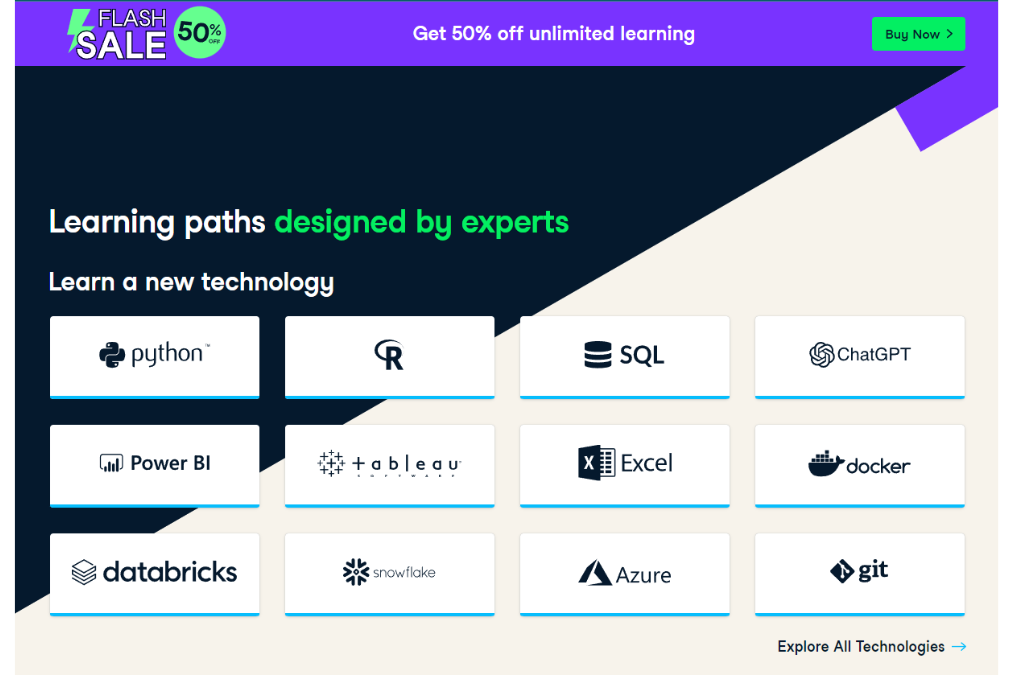
Are there any beginner courses on DataCamp
Beginner Courses on DataCamp
- Introduction to Python: This course covers the basics of Python programming, focusing on data analysis. It includes topics like Python syntax, functions, and libraries such as NumPy and pandas. The course is designed to be beginner-friendly and takes about four hours to complete. It is also available for free.
- Introduction to SQL: Aimed at beginners, this course teaches the fundamentals of SQL, including how to query relational databases. It takes approximately two hours and covers the organization of databases, writing basic queries, and understanding different SQL flavors like PostgreSQL and SQL Server. This course is also free.
- Introduction to R: This course introduces R programming, focusing on data visualization and statistical analysis. It is suitable for beginners and provides hands-on exercises to reinforce learning. The course duration is similar to the others, making it a manageable option for new learners.
- Understanding Data Science: This course provides a broad overview of data science concepts, including the data science workflow and key techniques used in the field. It is designed for those who want to understand the big picture of data science before diving into specific programming languages.
- Introduction to Power BI: This course introduces users to Power BI, a popular tool for data visualization and business intelligence. It is suitable for beginners and covers the basics of creating reports and dashboards.
Learning Paths
DataCamp also offers structured learning paths, known as Skill Tracks, which guide learners through a series of courses. For beginners, the following tracks are available:
- Data Scientist in Python: This track includes multiple beginner courses, starting with Python fundamentals and advancing to data manipulation and visualization.
- Data Analyst in R: Similar to the Python track, this path focuses on R programming and includes beginner-level courses that build foundational skills in data analysis.
These beginner courses and tracks are designed to provide a solid foundation in data science, making them ideal for anyone looking to start their journey in this field.
What is the DataCamp certification renewal process?

What is the DataCamp certification renewal process
DataCamp certifications are designed to validate proficiency in data roles such as Data Analyst, Data Scientist, and Data Engineer. Unlike some certifications that are permanent, DataCamp certifications do expire and must be renewed periodically to maintain active status.
Renewal Process
- Expiration: DataCamp certifications have a set expiration date. The specific duration before renewal is not detailed in the search results, but it is common for certifications to require renewal every few years to ensure that the certified individual’s skills remain current.
- Renewal Requirements: To renew a certification, individuals typically need to demonstrate that they have maintained or improved their skills. This may involve completing additional training or assessments, though the exact requirements for DataCamp are not explicitly outlined in the provided results.
- No Renewal for Some Certifications: Notably, the DataCamp Data Analyst Certification is mentioned as having no renewal process; once earned, it is valid for life. This suggests that while some certifications may require renewal, others may not.
- Continuous Learning: DataCamp encourages ongoing learning and skill development, which aligns with the need for certification renewal. Engaging in new courses or projects on the platform can help maintain and enhance the necessary competencies.
In summary, while DataCamp certifications generally require renewal to ensure skills remain relevant, the Data Analyst Certification is an exception, being valid indefinitely once obtained. For other certifications, staying updated with the latest industry practices and possibly completing further assessments will be essential for renewal.
How DataCamp Certifications Are Validated
DataCamp certifications are designed to validate an individual’s proficiency in key competencies required for various data roles, such as Data Analyst, Data Scientist, and Data Engineer. The validation process involves several structured steps to ensure the reliability and relevance of the certifications.

How DataCamp Certifications Are Validated
Certification Development Process
- Job Task Analysis: The initial phase involves conducting a job task analysis to identify the essential skills and competencies for each role. This analysis is informed by interviews with subject matter experts and hiring managers to ensure alignment with industry standards.
- Certification Specification: Based on the job task analysis, a certification specification is developed. This includes defining the domains, competencies, and knowledge, skills, and abilities (KSAs) that candidates must demonstrate.
- Advisory Panel: DataCamp collaborates with an advisory panel consisting of industry experts to review and validate the certification content and structure. This panel ensures that the certifications remain relevant to current job market demands.
- Assessment Methods: The certification exams utilize rigorous assessment methods, including practical exams and case studies, to evaluate candidates’ capabilities. These assessments are designed to be valid and reliable, reflecting the core competencies determined through the job analysis.
- Continuous Improvement: The certification process is dynamic, with ongoing updates and revisions to maintain relevance. DataCamp’s technical manual serves as a living document that outlines the certification’s design and development, including evidence of its validity and fairness.
Certification Features
- Accessibility: The exams are designed to be accessible online, allowing candidates to complete them from anywhere in the world. This is facilitated through a hosted coding environment that requires no local setup.
- Expiration and Renewal: Unlike simple course completion certificates, DataCamp certifications have an expiration date and require renewal to ensure that certified individuals maintain their knowledge and skills over time.
- Industry Recognition: DataCamp certifications are developed in collaboration with industry leaders, enhancing their credibility and recognition in the job market. They aim to provide a competitive edge to individuals seeking employment in data-related fields
DataCamp certifications are validated through a comprehensive process that includes expert input, rigorous assessment methods, and continuous updates to ensure they meet industry standards and effectively measure candidates’ competencies.
How do I choose the right DataCamp course for my skill level?
Here are some tips for choosing the right DataCamp course based on your skill level:
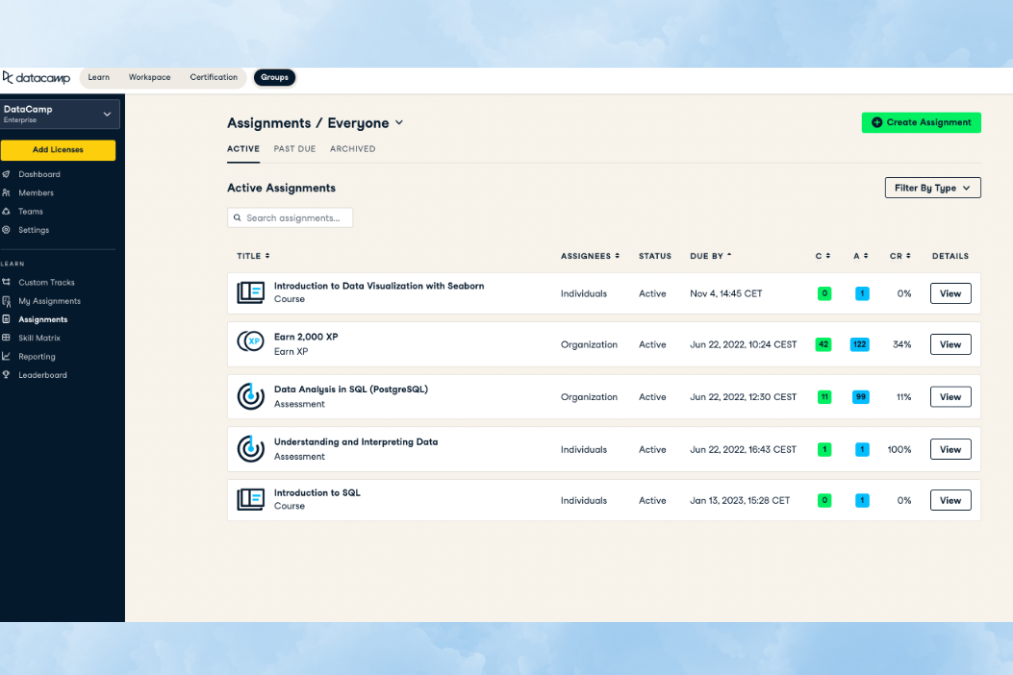
How do I choose the right DataCamp course for my skill level
Assess Your Current Skills
- Take DataCamp’s free skill assessments to get a baseline of your current knowledge in areas like Python, R, SQL, etc.
- Review the course descriptions and prerequisites to ensure you meet the recommended background for each course.
Choose Beginner Courses if You’re New to Data Science
- Take introductory courses like “Introduction to Python” or “Introduction to R” to build fundamental programming skills.
- Follow structured learning paths like Skill Tracks or Career Tracks designed for beginners.
- Practice regularly and complete all coding exercises to reinforce concepts.
Select Intermediate Courses to Deepen Your Knowledge
- Once you have a solid foundation, take more specialized courses in data manipulation, machine learning, visualization, etc.
- Skill Tracks like “Data Manipulation in Python” or “Machine Learning Fundamentals” are great options.
- Challenge yourself with hands-on projects to apply your new skills.
Pursue Advanced Courses for Specialized Skills
- Experienced learners can take advanced courses like “Machine Learning with Python” or “Data Visualization with R”.
- Career Tracks prepare you for specific job roles like Data Scientist or Data Analyst.
- Earn certifications by passing exams and completing practical assessments to validate your skills.
Get the Most Out of DataCamp
- Take advantage of the free trial to explore the platform and find the right courses.
- Engage with the DataCamp community on Reddit and the platform for help and support.
- Supplement courses with additional resources like books, blogs, and projects to deepen your learning.
By assessing your current skills, choosing the appropriate learning path, practicing regularly, and leveraging the DataCamp community, you can find the right courses to build your data science expertise. The platform’s interactive format and structured tracks make it easy to learn at your own pace and skill level.
Conclusion: Datacamp reviews as an e-learning platform
Datacamp has established itself as a leading e-learning platform for data science and programming. Its comprehensive curriculum, interactive learning environment, and practical approach make it a valuable resource for individuals looking to acquire or enhance their skills in these fields.
The hands-on exercises, real-world projects, and personalized learning experience offered by Datacamp set it apart from other e-learning platforms. The positive testimonials and success stories from users further demonstrate its effectiveness in helping individuals achieve their goals.
While Datacamp certificates may not carry the same weight as a university degree or extensive professional experience, they can still be valuable in showcasing your dedication to continuous learning and your skills in data science and programming.
In conclusion, Datacamp is a legitimate and worthwhile investment for individuals seeking to expand their knowledge and skills in data science and programming. Whether you are a beginner or an experienced professional, Datacamp provides a comprehensive and engaging learning experience that can help you advance in your career.



